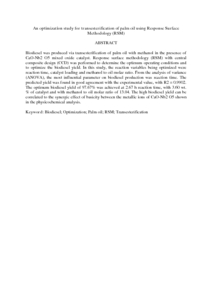Citation
Wong, Yee Ching and Tan, Yen Ping and Yap, Taufiq Yun Hin and Ramli, Irmawati
(2015)
An optimization study for transesterification of palm oil using response surface methodology (RSM).
Sains Malaysiana, 44 (2).
pp. 281-290.
ISSN 0026-6039
Abstract
Biodiesel was produced via transesterification of palm oil with methanol in the presence of CaO-Nb2 O5 mixed oxide catalyst. Response surface methodology (RSM) with central composite design (CCD) was performed to determine the optimum operating conditions and to optimize the biodiesel yield. In this study, the reaction variables being optimized were reaction time, catalyst loading and methanol to oil molar ratio. From the analysis of variance (ANOVA), the most influential parameter on biodiesel production was reaction time. The predicted yield was found in good agreement with the experimental value, with R2 = 0.9902. The optimum biodiesel yield of 97.67% was achieved at 2.67 h reaction time, with 3.60 wt. % of catalyst and with methanol to oil molar ratio of 13.04. The high biodiesel yield can be correlated to the synergic effect of basicity between the metallic ions of CaO-Nb2 O5 shown in the physicochemical analysis.
Download File
![[img]](http://psasir.upm.edu.my/43734/1.hassmallThumbnailVersion/An%20optimization%20study%20for%20transesterification%20of%20palm%20oil%20using%20Response%20Surface%20Methodology%20%28RSM%29.pdf)  Preview |
|
PDF (Abstract)
An optimization study for transesterification of palm oil using Response Surface Methodology (RSM).pdf
Download (4kB)
| Preview
|
|
Additional Metadata
Actions (login required)
 |
View Item |

